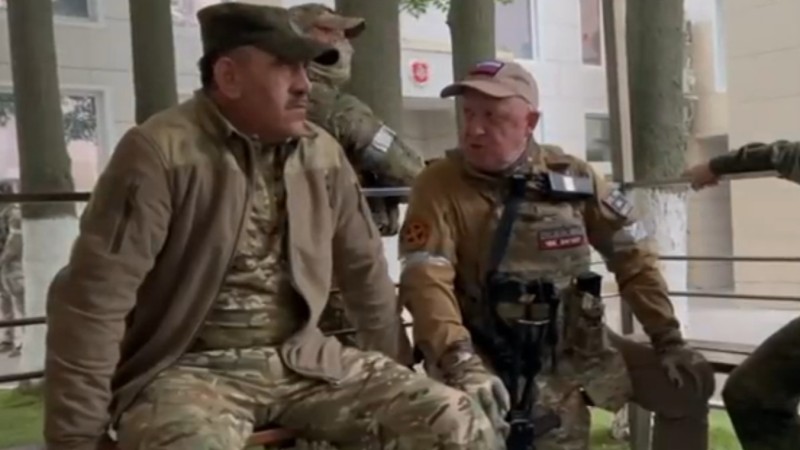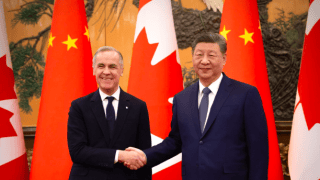- ANALIZA
Prigozhin’s War
Any war features the fog of war, as it is underway. That fog may be more, or less dense. However, it always leads to circumstances in which diligent reporting and analysis remain impossible. The current Russian aggression against Ukraine is an extreme case of the lack of access to true data and information.

Photo. Wagner Group/Telegram
The same applies to the events that unfolded on Friday and Saturday, involving the Yevgeniy Prigozhin's Wagner Group. The scale of assessment remains broad. It ranges from an actual revolt initiated by Prigozhin, utilizing the complete decomposition of the Russian C2 system, or a staged series of events, co-arranged with the authorities in Moscow. It seems that getting the right diagnosis here is impossible. We do not even know whether Western intelligence would be able to make anything out of what happened. We will probably know more as time goes by, but now it is worth pointing out the inconsistencies, and surprising turns of events.
Prigozhin was claiming that his revolt is not against President Putin, as it is rather targeting the Russian head of MoD, Army General Shoygu, and his first deputy, General Gerasimov, head of the General Staff in the Russian Federation. This was supposedly motivated by the erroneous decisions made throughout the war in Ukraine. On Sunday, when the Wagner Group stated that the operation was accomplished, it was announced that the matter "would be dealt with". Meanwhile, the official website of the Russian Army, on Monday morning, featured a movie clip and photos depicting another Shoygu's visit to the command of the "West" Military Gathering Point. We do not know when that content was recorded, but it was not an accident for it to appear on the site on Monday morning. It is proof of the fact that the Russian official is defending himself.
The clip published on Saturday, depicting Prigozhin negotiating a deal with Russian Generals in Rostov on Don is equally puzzling. The movie does not seem to depict negotiation, but it rather shows Prigozhin in the corner. The conversation involved the Deputy Minister of Defence, Gen. Col. Yunus-Biek Yevkurov, responsible for the training of the Russian Armed Forces, and Deputy Head of (formerly GRU) Main Directorate of General Staff, Lt. Gen. Vladimir Alexeyev. The course which that conversation took and the surrounding circumstances were shocking as well. The conversation was taking part in the courtyard of the Garrison, most probably of the Southern Military District, and it was being recorded by the Wagner Group. The interlocutors were surrounded by armed Prigozhin's bodyguards, and the Russian generals were alone and unarmed. Is this the way to negotiate?
The entrance the Wagner Group made in Rostov was also nothing short of spectacular. The Wagner Group is a PMC that works for the Russian authorities, and the Russian MoD. The movie clips show them entering the city freely. They had more than 100 kilometers to cover, they had to leave the warzone and use the public roads. The Russians usually deploy military traffic control units in such circumstances. The movement of Prigozhin's troops could not have gone unnoticed. The question is whether that movement was tolerated, or has the inertia of military hierarchy led to a complete surprise in Rostov.
Unfortunately, it remains fairly difficult to determine what Russian military units remain in specific regions in Russia. The maps, frequently published online, show whole Russian units and elements in Ukraine, at the frontline. One should however remember that whole units are not necessarily deployed there, the above rather concerns select and detached elements. This is caused by the fact that contractors, professional troops, and volunteers are all engaged in the War in Ukraine. These units draft new troops, train them, and still partially remain at their permanent bases in Russia. The same applies to heavier Russian equipment. Units formed by recruits or elements not involved in the war can defend Moscow, Rostov, or Voronezh.
Nothing like that could have been witnessed on Friday evening, or Saturday. It was just the opposite. The roadblocks did not seem serious. Small Rosgvardia and Police squads with light weapons, or a single APC were rather unable to resist the Prigozhin's columns.
The Wagner Group was armed by Russia: with main battle tanks, infantry fighting vehicles, or combat aircraft. The movie clips even depicted an active Pantsir-S1 air defence system. If the Russians took the further movement of those columns towards Moscow seriously, the SEAD operation would be the first step. The reports on Mi-35, Mi-8, or Il-22M being shot down do not make it possible to determine whether these entered the Wagner Group's IADS NEZ accidentally. Those, being unaware of the flights' purpose or association, shot the aircraft down. The Wagner columns were disorganised and could be viewed as an easy target by the Russian military aviation. A question that emerges is whether they were bombed on purpose, as the negotiation was underway, and whether some parties in Moscow were supporting the Wagner Group and hampering the operations undertaken by the Russian Army.
The negotiation itself, also reportedly involving Lukashenko, was also reported in a shocking manner. On one hand, the Belorussian propaganda depicted the process as critical, and Putin thanked Lukashenko, on the other, the Prigozhin's objective is unknown. Seeking asylum in Belarus probably was not the goal of the person who got rich by working closely with the Kremlin. Furthermore, if the Wagner Group's retreat was facilitated by Lukashenko, then what is Putin's reputation here, as his mentor? Is Lukashenko willing to escape Putin's influence and become a leader of a new Russian-Belorussian union state?
Another riddle concerns the preparations made, to defend Moscow. This matter seems less serious though. Back in 1941, Moscow was defended by the whole Soviet Nation. Only counter-terrorist units were deployed last Saturday. These activities could have been viewed as a demonstration of power - they were not preparing the city for a defensive operation. It was not assumed that Prigozhin would come to Moscow, leading a column of mercenaries. Even if he arrives, what a couple of thousand troops could do around the capital city, with a population of several million? To make a mutiny as such possible, the Prigozhin fuse would need to lead to an explosion of the Moscow power structure - the authorities and services in Moscow would need to endorse, or even control the Prigozhin's effort. Meanwhile, no structures as such power centers exposed themselves, endorsing Prigozhin to even the slightest degree. Even if he had some allies in Moscow, their lack of any action entirely negated their being useful or creative.
It is also a surprise that Putin decided to do nothing, publicly. His morning address on national TV, on Saturday, seemed threatening. However, hours later, when the Wagner Group was leaving Rostov, Putin made no public appearances announcing victory. It was just the opposite. His Press Secretary, Dmitriy Peskov announced that the words said by Putin guarantee an asylum for Prigozhin in Ukraine. The political part of the Saturday act lacked any dynamics whatsoever, also not creating any basis for a judgement whether the Kremlin official engaged in a discussion and political battle, or whether that was just another element of a jigsaw puzzle.
The political events in Russia, expected over the upcoming days, could unveil the secrets behind all of those circumstances. So far it seems Moscow has lost all of its prestige and credibility, in the international and domestic arena. Putin's position may have been shaken as well. But if all of that was a deliberate game, it may be a symptom of serious changes that can be expected in Ukraine. It may either lead to a dialogue between the parties or to intensified aggression, with the new military leadership.
It is plausible that the battle between Prigozhin and Shoygu-Gerasimov, the latter won, and the Wagner Group's raid has been just a swan's song. That would mean that Prigozhin's ambition took over and dominate the further willingness to conduct profitable business activities. It is also possible that Shoygu's order to register non-military units fighting in Ukraine was a provoking factor here. That seems realistic. The Wagner Group is fighting in Ukraine based on contracts signed with the Ministry of Defence. These contracts concern both the Group's remuneration, transfer of equipment, or munitions. What registration was necessary here then? The Friday and Saturday events will probably divide the Prigozhin's soldiers. Some of them may become Russian Army contractors directly, while some may join some organization evolving from what's been left of the Wagner Group. Unless the Group would remain active, under Belorussian command. However, that seems unlikely.
The coming days would bring more clarity for us to draw further, more detailed conclusions.
One should yet again point out the lack of predictability in the case of Russia. Gathering and analyzing data on that state needs to be meticulous. One should remember that drawing the right conclusions is not always guaranteed, even if the analytical effort is detailed. Media attention based on immediate conclusions cannot be viewed as diligent. And this is what the descriptions of mutiny, the march headed towards Moscow, and surrendering Russian units looked like, with comparisons to 1917, the expected decline of the Russian empire, and other comments.
For Russia, this is not the case. It seems that the frontline is still static on Monday, with position warfare underway. That war leads to thousands of deaths, and no change of dynamics is visible. Maybe the lack of the ability to change the course of the war caused the Prigozhin's revolt.















